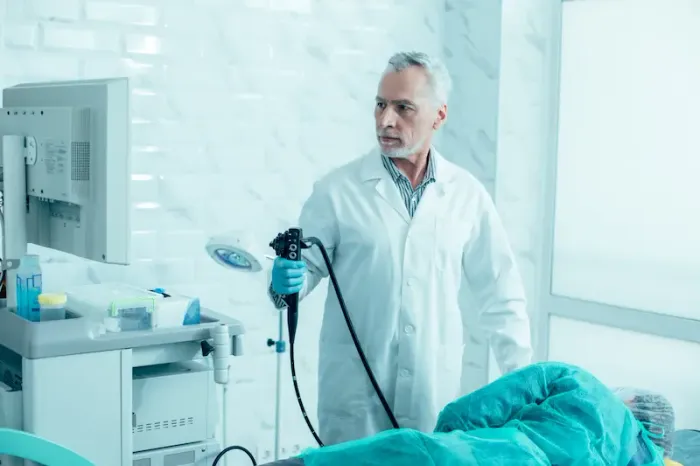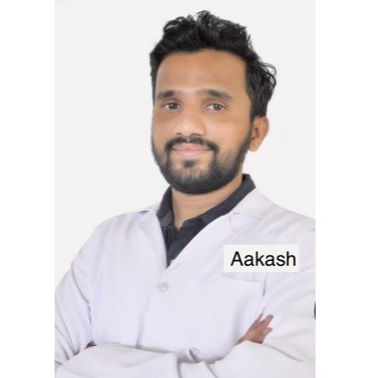Guide to Can Colonoscopy Be Painful If I Have
Is a colonoscopy painful? Get the real answers here. Our guide explains what to expect, how pain is managed, and tips for a comfortable procedure. Don't let fear hold you back from this vital screening.

Written by Dr. Vasanthasree Nair
Reviewed by Dr. Mohammed Kamran MBBS, FIDM
Last updated on 13th Jan, 2026

Introduction
The word "colonoscopy" often triggers a wave of anxiety, primarily centered on one daunting question: "Will it be painful?" It's a valid concern. The thought of a procedure in a sensitive area is naturally intimidating. However, the reality of a modern colonoscopy is vastly different from the fear it inspires. Thanks to advanced sedation techniques, most people sleep comfortably through the entire procedure and remember very little, if anything, about it. This article will demystify the experience, separating fact from fiction. We'll walk you through every stage—from the infamous prep to the recovery—and provide honest insights into the sensations you might feel. Our goal is to replace your anxiety with knowledge, empowering you to approach your colonoscopy with confidence and peace of mind.
Understanding the Colonoscopy Procedure
A colonoscopy is a vital diagnostic and preventive medical exam where a gastroenterologist uses a long, flexible tube called a colonoscope to examine the inner lining of your large intestine (colon and rectum). The colonoscope has a tiny video camera at its tip that sends images to a monitor, allowing the doctor to look for abnormalities like inflammation, bleeding, ulcers, and most importantly, precancerous polyps. These polyps can be removed during the procedure itself, which is a key reason why colonoscopies are so effective at preventing colorectal cancer.
The procedure typically takes 30 to 60 minutes and is performed in an outpatient setting. You will be given sedation through an IV to ensure you are relaxed and comfortable. The doctor will gently insert the scope and inflate the colon with a small amount of air to get a clearer view. This inflation is the primary source of the sensation people might feel.
Consult Top Specialists for Personalised Tips
The Myth vs. Reality of Colonoscopy Pain
The myth is that a colonoscopy is an excruciatingly painful experience. The reality, for the overwhelming majority of patients, is that it is not.
The Myth: Stemming from older practices and the fear of the unknown, many imagine the procedure as intensely uncomfortable or even agonizing.
The Reality: With modern sedation options, you are in a deeply relaxed state. A study published in the journal Gastrointestinal Endoscopy found that over 95% of patients reported little to no pain during their colonoscopy and would be willing to have another one under the same conditions. The most common recollection is simply going to sleep and waking up with the procedure completed. Any discomfort is typically limited to the preparation stage beforehand or some temporary gas pains afterward.
Factors That Influence Discomfort During a Colonoscopy
While generally not painful, the level of comfort can vary based on several key factors.
The Type of Sedation Used
This is the most significant factor in determining your experience.
Conscious Sedation (Twilight Sedation)
This involves medications like midazolam (a sedative) and fentanyl (a pain reliever). You are technically awake but in a deeply relaxed, drowsy state. You can follow basic commands but will likely have little to no memory of the procedure. Some patients might feel mild pressure or cramping, but it is usually fleeting and not remembered as painful.
Deep Sedation (Propofol)
Often called "propofol" or " monitored anesthesia care (MAC)," this is administered by an anesthesiologist or nurse anesthetist. It induces a very short, deep sleep from which you wake up quickly once the medication is stopped. Patients under deep sedation feel absolutely nothing during the procedure and often report it was the best nap they've ever had. This is increasingly becoming the standard of care.
Your Individual Anatomy and Health
Certain conditions, such as a history of abdominal surgeries, pelvic adhesions, or diverticular disease, can make navigating the colonoscope slightly more challenging for the physician, potentially leading to more sensation. Being very thin or having a particularly tortuous colon can also be factors. Communicating your full medical history with your doctor is crucial.
The Skill and Experience of Your Gastroenterologist
An experienced gastroenterologist performs the procedure with a gentle, precise technique. Their expertise in maneuvering the scope and managing air insufflation minimizes patient discomfort. This is why choosing a qualified and reputable specialist is important.
The Most Common Source of Discomfort: The Prep
Let's be honest: if there's a challenging part of the colonoscopy process, it's the bowel preparation, not the procedure itself. The goal is to completely empty your colon so the doctor has a perfectly clear view. This involves drinking a prescribed laxative solution over several hours, which leads to frequent, watery diarrhea.
This process isn't painful in the traditional sense, but it can be uncomfortable, tedious, and can cause bloating, nausea, and chills. The taste of the prep solution is often cited as the worst part.
Tips to Make the Bowel Prep Process Easier
Chill it: refrigerate the prep solution.
Use a straw: place the straw toward the back of your mouth to bypass some taste buds.
Chase it: sip on a clear, pleasant tasting liquid like white grape juice or ginger ale between gulps of prep (check with your doctor for approved options).
Apply cream: use petroleum jelly or a barrier cream around your anus to prevent irritation from frequent wiping.
What Does It Feel Like After a Colonoscopy?
After the procedure, you'll wake up in a recovery area. The most common sensation is bloating and mild cramping. This is caused by the air that was used to inflate your colon during the exam. This feeling is completely normal and temporary.
Managing PostColonoscopy Bloating and Gas
The best way to relieve this is to pass the gas. Don't be shy about it! Walking around can help move the gas through your system and provide relief much faster. The bloating typically subsides within a few hours.
Painless Colonoscopy Alternatives: Are They Effective?
For those who remain highly anxious, alternatives exist, but they come with significant caveats.
Virtual Colonoscopy (CT Colonography)
This uses a CT scanner to take images of your colon. It is less invasive and requires a less intense prep. The major drawback? If any polyps or abnormalities are found, you will still need a traditional colonoscopy to have them removed and biopsied. It also involves radiation exposure.
Stool-Based Tests (FIT, Cologuard)
These noninvasive tests check for hidden blood or altered DNA in your stool. They are convenient and done at home. However, they are only screening tests. A positive result means you will absolutely need a colonoscopy to investigate the cause. They are also less effective at detecting precancerous polyps before they become cancerous.
For a truly preventive approach, a traditional colonoscopy remains the gold standard.
How to Communicate Your Concerns for a Comfortable Experience?
Your number one tool for ensuring a comfortable experience is open communication.
1. During Consultation: Express your anxiety about pain clearly to your gastroenterologist. Ask about their standard sedation protocol and discuss deep sedation (propofol) as an option.
2. Before the Procedure: Tell the nursing staff you are nervous. They are experts at providing reassurance.
3. During the Procedure: If you are under conscious sedation and feel any significant discomfort, you can (and should) tell the medical team. They can adjust your medication accordingly.
If you have a low pain tolerance or a history of anxiety, consulting a doctor online with Apollo24|7 for a preprocedure discussion can help you get all your questions answered from the comfort of your home.
Quick Takeaways: Your PainFree Colonoscopy Checklist
The procedure itself is not painful for the vast majority due to effective sedation.
The biggest challenge is often the bowel preparation, not the exam.
Discuss sedation options (especially propofol) with your doctor beforehand.
Postprocedure bloating is normal and resolves quickly by passing gas.
Choosing an experienced gastroenterologist is key to a comfortable experience.
Communicate your fears openly with your medical team.
The lifesaving benefits of preventing colon cancer far outweigh the temporary discomforts.
Conclusion
The fear of a painful colonoscopy is understandable but largely outdated. While the preparation requires patience and the idea can provoke anxiety, the procedure itself, thanks to modern medicine, is a manageable and well tolerated experience. The mild and temporary discomforts are insignificant when weighed against the profound benefit: colonoscopies can detect and remove precancerous polyps, effectively preventing colorectal cancer before it even starts. It is one of the most powerful preventive tools in modern healthcare. By choosing a skilled doctor, discussing sedation options, and focusing on the lifesaving outcome, you can face your colonoscopy not with fear, but with confidence. Don't let the myth of pain prevent you from taking this critical step for your long-term health. If symptoms like persistent abdominal pain, rectal bleeding, or changes in bowel habits have led to your search, book a physical visit to a doctor with Apollo24|7 to discuss if a colonoscopy is right for you.
Consult Top Specialists
FAQs About Colonoscopy and Pain
1. Can you feel pain during a colonoscopy with sedation?
Most patients under sedation feel absolutely nothing. Those under conscious sedation may feel mild pressure or brief cramping but it is rarely remembered as painful due to the amnesic effect of the medication.
2. What is the pain level of a colonoscopy on a scale of 1 to 10?
For most patients under adequate sedation, the pain level during the procedure is 0 or 1. The prep might rate a 35 for discomfort (not pain) due to bloating and frequent bathroom trips. The recovery is typically a 12 for bloating.
3. Is it better to have a colonoscopy with or without sedation?
For almost everyone, sedation is strongly recommended. An unsedated colonoscopy is rarely performed and can be very uncomfortable and difficult to tolerate, making it harder for the doctor to perform a thorough exam.
4. How long does pain last after a colonoscopy?
Any "pain" is usually just gas-related bloating and cramping, which should resolve within a few hours to a day. If you experience severe abdominal pain, fever, or heavy bleeding after going home, contact your doctor immediately.
5. What if I wake up during the procedure?
This is extremely uncommon, especially with deep sedation. Even with conscious sedation, you are in such a drowsy state that you are unlikely to be fully aware or remember the event. The medical team continuously monitors your comfort level and can administer more medication if needed.
Consult Top Specialists for Personalised Tips

Dr Syed Mateen Pasha
General Physician
2 Years • MBBS
Bengaluru
PRESTIGE SHANTHINIKETAN - SOCIETY CLINIC, Bengaluru

Dr. Vivek D
General Physician
4 Years • MBBS
Bengaluru
PRESTIGE SHANTHINIKETAN - SOCIETY CLINIC, Bengaluru

Dr. Anand Ravi
General Physician
2 Years • MBBS
Bengaluru
PRESTIGE SHANTHINIKETAN - SOCIETY CLINIC, Bengaluru

Dr Aakash Andgi
General Physician/ Internal Medicine Specialist
9 Years • MBBS MD
Bengaluru
Apollo Clinic, JP nagar, Bengaluru

Dr. Harshendra Jaiswal
General Physician/ Internal Medicine Specialist
12 Years • MBBS , MD (General medicine)
Kolkata
108 DHANA DHANVANTARI Clinic, Kolkata
(25+ Patients)
Consult Top Specialists

Dr Syed Mateen Pasha
General Physician
2 Years • MBBS
Bengaluru
PRESTIGE SHANTHINIKETAN - SOCIETY CLINIC, Bengaluru

Dr. Vivek D
General Physician
4 Years • MBBS
Bengaluru
PRESTIGE SHANTHINIKETAN - SOCIETY CLINIC, Bengaluru

Dr. Anand Ravi
General Physician
2 Years • MBBS
Bengaluru
PRESTIGE SHANTHINIKETAN - SOCIETY CLINIC, Bengaluru

Dr Aakash Andgi
General Physician/ Internal Medicine Specialist
9 Years • MBBS MD
Bengaluru
Apollo Clinic, JP nagar, Bengaluru

Dr. Harshendra Jaiswal
General Physician/ Internal Medicine Specialist
12 Years • MBBS , MD (General medicine)
Kolkata
108 DHANA DHANVANTARI Clinic, Kolkata
(25+ Patients)

.webp)


